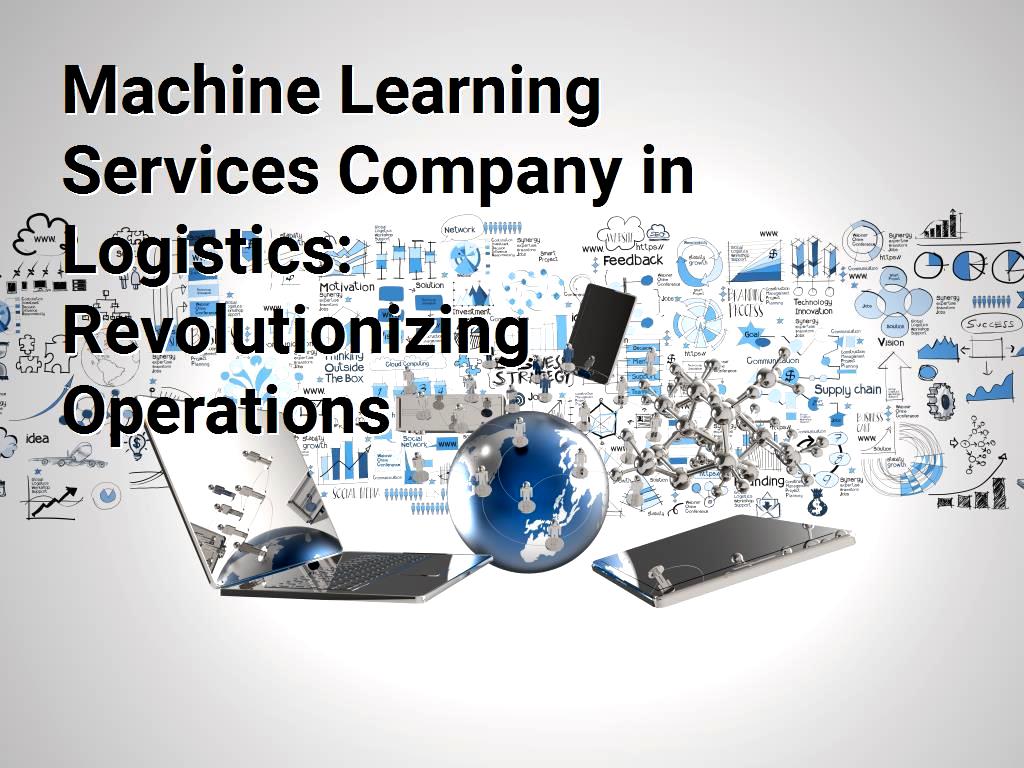Machine Learning Services Company in Logistics: Revolutionizing Operations
5 minute(s) read | Published on: Sep 25, 2023 Updated on: Sep 25, 2023 |
Consequently, a plethora of customized, cloud-based solutions have emerged to support data scientists in myriad ways.
The global machine learning market, as projected by Forbes, is set to skyrocket from $7.3 billion in 2020 to an astounding $30.6 billion in 2024, representing a staggering compound annual growth rate of 43%. In order to sustain this surge, data scientists and ML engineers face the task of constructing more models to meet the ever-evolving business needs of their customers and stakeholders.
However, merely building models is often insufficient. There's a need to:
1- Maintain these models,
2- Continuously assess and monitor their performance,
3- Implement large-scale deployments, and
4- Occasionally experiment with novel ideas while ensuring consistent production.
Given that most data scientists lack software engineering expertise, fulfilling business demands at scale can seem insurmountable. This is where Machine-Learning as a Service (MLaaS) steps in, enabling data scientists to navigate these intricacies more seamlessly.
Understanding (MLaaS)
Machine learning services company falls under the broader umbrella of 'as a service' offerings like Platform as a Service (PaaS), Software as a Service (SaaS), Backend as a Service (BaaS), and more.
MLaaS is a collection of cloud-based platforms leveraging this tools to offer solutions for ML teams. These encompass:
1- Out-of-the-box predictive analysis for diverse use cases,
2- Data pre-processing,
3- Model training and fine-tuning,
4- Orchestration of runs, and
5- Model deployment.
By harnessing the power of cloud computing, MLaaS facilitates on-the-go this services.

What to Expect from an MLaaS Platform
MLaaS platforms play a crucial role in streamlining various aspects of artificial intelligence in logistics. They offer:
1- Data Management: As companies transition from on-premise to cloud storage, organizing data becomes paramount. MLaaS platforms, serving as cloud providers, facilitate efficient data management for tasks like machine learning experiments and data pipelining.
2- Access to ML Tools: MLaaS providers furnish tools such as predictive analytics and data visualization. They also provide APIs for sentiment analysis, face recognition, creditworthiness assessments, and more. Data scientists are relieved from the computational intricacies, with some platforms even offering intuitive interfaces for model development.
3- Ease of Use: MLaaS empowers data scientists to embark on it swiftly, bypassing the cumbersome process of software installations or the need for personal servers. The provider's data centers handle the computational load, ensuring convenience at every juncture.
4- Cost Efficiency: Setting up an ML workstation can be costly. MLaaS offers a more cost-effective alternative, as expenses are incurred only when hardware is actively utilized.
Best Tools in the Market
The MLaaS market is thriving, with a projected value of $8.48 billion by 2025. Here's an overview of MLaaS platforms from industry giants: Amazon, Google, Microsoft, and IBM.
Amazon Services:
Amazon offers a comprehensive suite of machine learning tools. Its predictive analytics is recognized for its automation capabilities, streamlining data preprocessing. While this automation expedites processes, it may necessitate additional customization for precise results. Amazon's services include: - Amazon Comprehend for natural language processing
- Amazon Lex for building chatbots
- Amazon Forecast for time series forecasting
- Amazon Rekognition for image and video analysis
- Amazon Polly for text to speech translation
- AWS DeepRacer, DeepLens, DeepComposer for deep learning services
The Amazon Sagemaker Studio provides an environment for efficient model building and deployment, simplifying workflows.
Microsoft Azure it Studio:
Azure Machine Learning Studio caters to both novice and experienced data scientists. It offers a user-friendly, graphical interface for tasks like data exploration, preprocessing, model selection, and result validation.
Azure's AI services cover a wide spectrum of applications, from anomaly detection to speech translation, and more. The Azure AI Gallery serves as a collaborative hub for model templates and algorithms.
Google Cloud Platform:
Google offers it and AI services through two main avenues: Google Cloud Machine Learning for tech-savvy data specialists, and Cloud AutoML for beginners. Cloud AutoML facilitates the uploading, training, and deployment of custom models.
Cloud AutoML includes services for image processing, video analysis, natural language processing, translation, and structured data modeling. Google Machine Learning Engine provides flexibility for experienced data scientists, supporting TensorFlow, scikit-learn, and other popular libraries.
IBM Watson Machine Learning:
IBM's MLaaS platform caters to both data scientists and developers, accelerating AI and machine learning deployment. It offers options like IBM Cloud Pak for Data, Watson Machine Learning Cloud, and Watson Machine Learning Server.
Watson supports end-to-end model management, versioning, and deployment. It also features pre-trained models and AI-powered applications for tasks like chatbots and sentiment analysis.
When to Use MLaaS:
- When there's a need for quick model development and deployment.
- When extensive data management and preprocessing are required.
- When cost efficiency and scalability are crucial.
- When access to a variety of pre-trained models is beneficial.
When Not to Use MLaaS:
- When data security mandates on-premise storage.
- When a high degree of customization or specialized algorithms is necessary.
- When optimization of training or serving costs for complex algorithms is a primary concern.
Click here to create a mobile app